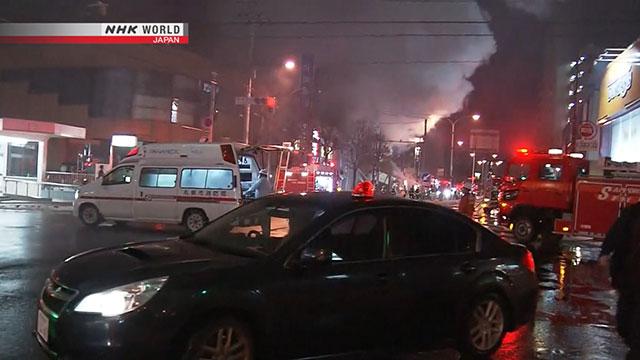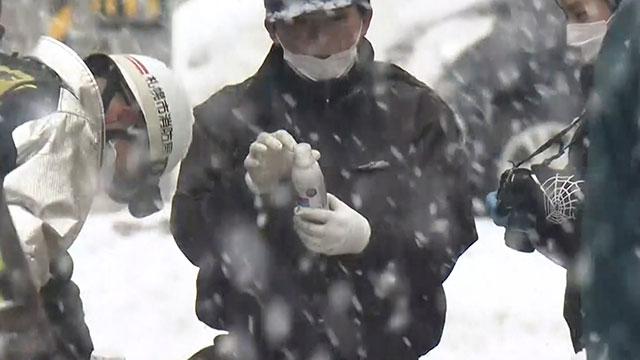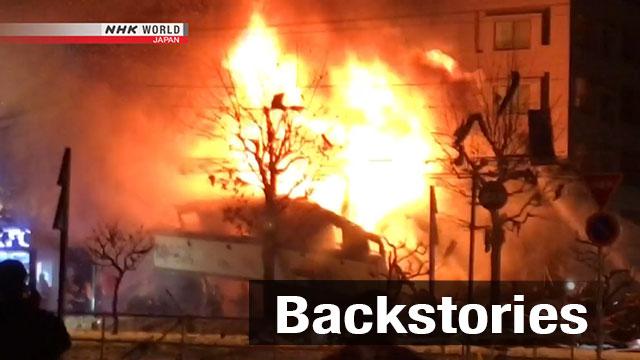Explosion amid year-end party season

The blast shook the building at around 8 PM. The izakaya was crowded with some 40 customers celebrating the year-end.
Investigators say it took about 10 minutes for the building to be engulfed in flames. Many witnesses say they heard loud bangs and felt shaking. A man who was on the second floor says that as he heard a bang, the room suddenly went dark and the ceiling collapsed. He says the floor partially crumbled and the wall facing the road was blown away, exposing the restaurant's interior. The man says, "I first thought it was an earthquake. I couldn't grasp what was going on. Parents were trying to calm down their children."
Firefighters used ladders to bring people to the ground, one by one, from the restaurant. None of the customers were reportedly wearing shoes, as the restaurant had required them to be taken off before entering.
The man said that as he waited for his turn to be saved, raging flames quickly spread to the second floor via the ventilation system a few minutes after the blast. He said he couldn't bear the heat and jumped to the ground. The man said, "The explosion was life-threatening. Even now, I feel scared when it gets dark. I can't go to work as I'm injured."

Spray cans to blame
The explosion is believed to have occurred in the office of a real estate firm in the building. Sources close to investigators quoted a company employee as saying that before the blast, he had emptied some 120 disinfectant deodorizer sprays in the office to dispose of the cans. He reportedly said the explosion occurred when he turned on a water heater.

The spray can manufacturer said dimethyl ether, a flammable gas, is used in the spray and that it has been sending 30 cans to the office every month.
Dimethyl ether has only a faint odor. The head of the real estate firm reportedly said he wasn't aware that they were handling flammable gas. Police suspect at least 20 liters of gas might have briefly filled the roughly 40-square-meter office.
Company apologizes

The head of the real estate firm, Taiki Sato, apologized at a news conference held in Sapporo. He said, "I'm truly sorry for having caused trouble to many people. I apologize to everyone who was injured and affected by the incident."
Sato said the explosion occurred two days before the office was to be renovated. Employees told Sato the blast struck when they activated a water heater after emptying the cans. Sato said, "The cans' expiry dates had not yet passed. I think it was unusual to empty them."
The cans were supposed to be used to disinfect and deodorize rooms that the company handles. But Sato said, "The company was charging customers for it, but I heard there are properties which were not sprayed. The inaction of our employees was disrespectful to customers. I heard there were too many properties to handle. But I will seriously reflect on the revelations, closely look into what happened."

Measures to prevent fire ignited by canned spray
The Tokyo Fire Department says there were 546 fires triggered by spray cans in the capital between 2013 and 2017. This year, it says there were 79 as of the end of November. Some of the fires were triggered by gas that spewed out when the cans were punctured before being discarded. In some other cases, fires started in garbage trucks when spray cans that were not fully emptied ignited inside the vehicles.
Professor Ritsu Dobashi at the University of Tokyo's School of Engineering is an expert on the mechanism of explosions. He urges people to take into account the risk of explosions when they dispose of spray cans containing flammable gas. The professor calls for discussions on safer ways to discard a vast amount of spray cans. Dobashi says, "Procedures to allow people to dispose of cans without emptying them could be an option. I think it's an issue that the whole of society should discuss."

